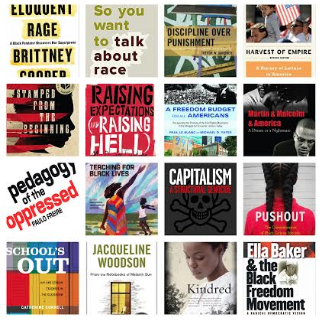Notes from Kathleen:
Are we in
a historical “moment”? What moment are
we in? Does it matter?
The Ella Baker book group had a lively second
discussion in Center City. We started with a paired discussion of the question,
“What were early moments of your own politicization?” One group member came to
realize the centrality of important relationships,
especially with those who were different from her, in her coming to see
injustices. This idea of relationships
is a central theme in Baker’s work.
Mapping
Baker’s Theory of Change
We “chalk talked” Baker’s Theory of Change, and
kept our chart in the center of our circle for the remainder of the discussion.
Themes of our discussion included:
What makes
a leader? What was Baker’s process
for building local, grassroots leaders? One way was sending local leaders to
national conferences and workshops to “boost their confidence as organizers and
give them intellectual perspectives and tactical ammunition for the struggles
they were engaged in” (Ransby, 2003).
How can we work within, outside, and
around institutions to make social change? Baker redefined her work in the
NAACP by building grassroots movements, rather than simply collecting
membership dues. She also held other voluntary
leadership positions in addition to her paid work with the NAACP.
What makes
a movement or action successful or not? For example, was the
Occupy Movement successful? What came
out of it? What had happened in the
years prior to the Montgomery Bus Boycott that led to its eventual
success?
In what
ways are we building relationships and responding to community needs at the
local level? In what ways do these local actions connect
to larger collective struggles? Our group described instances of ways that they
connect with neighbors and communities around local concerns, such as fish fries
to raise bail or community gardens projects initiated by block captains.
Are
organizers and activists today running on a hamster wheel? Or are we engaging in the long hard work that
happens during the decades before a
major social movement gains force?
Are we in
“a moment”? What moment are we in? Does
it matter?
As a group, we grappled with where we see
ourselves historically in terms of a
movement for racial justice. There was
general agreement that something important is happening, with mass uprisings in
response to police violence gaining national media attention (albeit skewed),
“Black Lives Matter” entering the national lexicon, and local organizers coming
together in ways they haven’t before.
But, are we on the brink of a watershed moment that will lead to large scale
political change?
As our time came to a close, this is the
question with which we grappled.
One group member shared her memories of the
response to the events surrounding Rodney King and the insight that it will be
a good sign when the protests are in response to the violence and not in
response to the non-indictments and acquittals.
Until there’s mass movement in response to the police violence, it shows
that there is still a level of trust in the system. Right now, the movement is
showing the Black deaths matter, she
said, but there needs to be a shift towards truly valuing Black lives.
As I left, I thought about the response to the
killing of Freddie Gray and felt some degree of hope.
And in the days since our discussion, I’ve
reflected on the work of the Caucus of Working Educators (WE) over the past
year and become excited by the parallels that I’ve seen between Baker’s work
and the work of WE: Building
relationships. Growing local
leaders. Responding to the immediate
needs of the people. Problem solving
around community problems, rather than collecting membership dues. Building relationships by talking to each
other. This is the stuff of a movement. And this is the moment that we’re in.
Links to
resources that came up in our discussion:
Showing Up
for Racial Justice (organization): http://www.showingupforracialjustice.org/
Through community organizing, mobilizing and
education, SURJ moves White people to act as part of a multi-racial majority
for justice with passion and accountability.
I’ve Got
the Light of Freedom
(book): https://zinnedproject.org/materials/ive-got-the-light-of-freedom/
Using wide-ranging archival work and extensive interviews
with movement participants, Charles Payne uncovers a chapter of American social
history forged locally, in places like Greenwood, Mississippi, where countless
unsung African Americans risked their lives for the freedom struggle. (Zinn
Education Project)
The Movement for Black Lives
Convening: http://movementforblacklives.org/about/
Hundreds of Black freedom fighters from around the
country will come together for the inaugural Movement for Black Lives Convening
in Cleveland, OH, from Friday July 24 to Sunday July 26th, 2015.This historic
event comes at a pivotal time for the growing movement for Black lives in the
United States.
#BlackLivesMatter: The birth of a new civil
rights movement (article): http://www.theguardian.com/world/2015/jul/19/blacklivesmatter-birth-civil-rights-movement?CMP=share_btn_fb
This recent article in The Guardian traces
the #BlackLivesMatter movement and contends with questions about leadership and
the current historical moment, which our group grappled with together.
Links
to Ella Baker’s Words:
Bigger Than
a Hamburger (writing): http://www.historyisaweapon.com/defcon1/bakerbigger.html
“Bigger Than a Hamburger” is one of the few public written documents by
Baker, and one of the best known.
This
short piece has has powerful insight on the importance of autonomous youth
leadership.
The Bronx Slave Market (article): http://1.scds.org/resources/US-History/1935_Ella%20Baker%20and%20Marvel%20Cooke,%20The%20Slave%20Market.pdf
Co-written in 1935 by Ella Baker and Marvel Cooke, this article, first
published in the white-owned the Crisis, exposed
the “humiliating experiences of black domestic workers who huddled together on
designated street corners in the early morning hours, waiting for white
middle-class women to look them over and choose a lucky one to hire for the
day” (Ransby, 2003).


